- Home
- Peter Swanson
Rules for Perfect Murders Page 10
Rules for Perfect Murders Read online
Page 10
I was prepared for all this in the same way that I wasn’t prepared for the soul-crushing minutiae of life. The bills. The food preparation. The slow dawning realization that adults live in uninteresting bubbles of their own making. Life is neither mysterious nor adventurous. Of course, I came to these conclusions before I became a murderer. Not that my criminal career satisfied the fantasy life I had as a kid. In my fantasies I was never the murderer. I was the good guy, the detective (amateur, usually), who solved the crime. I was never the villain.
Another skill set I thought I’d utilize more in my adult years was the ability to follow someone. And conversely, the ability to know when I was being followed. Again, these things never really came up. But on that Saturday night, after closing up Old Devils, I walked across the Boston Common, wind cutting through my clothes, and wound up at the bar at Jacob Wirth, drinking German beer and eating Wiener schnitzel. It was the middle of February but there were still Christmas lights strung up along the high ceilings of the beer hall, and, somehow, this place made me feel okay about eating alone. That was how I judged restaurants near me; there were the ones that made you feel lonely when you ate alone, like some of the higher-end haunts that clutter Back Bay, and then there were those places—Jacob Wirth, a restaurant called Stoddard’s—that were boisterous enough, and dark enough, that being alone didn’t seem to matter so much.
It was when I left Jacob Wirth, and began the cold walk home, that I felt sure I was being watched. Maybe I really have read too many books, but I felt it in my neck, an almost physical sensation that eyes were on me. I turned back, scanned the heavily bundled residents and tourists, but saw no one who seemed suspicious. But the feeling continued all the way to Charles Street, and when I turned up Revere toward my apartment, I looked back and saw a man, in the hazy light of the gas lamps, walking slowly across the intersection, his gaze in my direction, his face in shadow. The only distinguishing characteristic that I could make out was that he wore a hat, something with a narrow brim. He kept walking, a slow, rolling gait, and for a moment I almost considered turning around to confront him. But then he disappeared behind a building, and I changed my mind. Everyone walking along Charles Street glances up the residential side streets, especially in wintertime when they are at their prettiest.
When I was inside, I thought some more about the man on the street and decided that I was being paranoid. No one was literally following me. But that didn’t mean that I wasn’t being watched, somehow, that I wasn’t being toyed with.
Ever since Gwen Mulvey had arrived at Old Devils, asking me about the list of perfect murders, I’d been thinking about my shadow, the man (I always thought of him as a man) whom I’d met when he answered an anonymous message about Strangers on a Train. The man who killed Eric Atwell for me. The man who wanted Norman Chaney dead.
What if he’d figured out who I was? It wouldn’t have been too hard. Maybe he found me by doing some research into Eric Atwell. If he’d done just a little looking, he would have found out about Claire’s car accident, and the husband left behind, a man who worked at a mystery bookstore. Not only that, but a man who had once published a blog post about his eight favorite perfect murders, one of them being Strangers on a Train. It would have been easy to find me. And once he did, then what? Maybe he’d enjoyed killing Eric Atwell, and he wanted to keep on doing it? What if he decided to use my list as a blueprint for further murders? It would be a way to get my attention. It had, hadn’t it? Was it all some kind of game?
The more I thought about it, the more I became convinced that Charlie, who’d staged the A.B.C. murders, and the train murder from Double Indemnity, and probably scared Elaine Johnson to death up in Rockland, Maine, was the same man who’d shot Eric Atwell for me.
He knew me.
And his actions had brought the FBI to my door. Maybe that was his intention, as well.
Charlie, what is it that you want?
I thought some more about Strangers on a Train. The book wasn’t about the people who were murdered. It was about Bruno and Guy, the murderers, and their relationship with each other. Maybe whoever I contacted through that website felt as though we were in a relationship as well. I remembered the commenter on my blog post, Doctor Sheppard. It was clear he wanted to know me, and that he wanted me to know him.
My cell phone rang. I looked and saw it was Gwen.
“Hello,” I said.
“Sorry I’m calling you so late. Were you up?”
“It’s fine,” I said. “I’m up.”
“Great. A couple of things. I did some more poking around in the case of Elaine Johnson, the heart attack victim.”
“Right.”
“I spoke with the police detective who attended the scene, and she told me that the house was absolutely packed with books.”
“I’m not surprised.”
Gwen paused, then said, “I have a request of you. I know it’s strange, but I think it would be helpful. I’m driving to Rockland tomorrow afternoon. Could you come with me?”
“I suppose I could,” I said, “but I’m not sure I’d be any help. What would I be able to see that you wouldn’t be able to?”
“I’ve already thought about this,” Gwen said. “Maybe you’d see nothing, but maybe you’d see a lot. You knew her. I’m not sure it would be helpful, but I don’t think it could hurt. Does that make any sense to you?”
“A little bit,” I said.
“So you’ll come?”
“Sure, I guess. When are you leaving?”
“Excellent. I have to be here in New Haven all morning, and then I thought I could leave around noon. I’ll swing through Boston and pick you up one thirtyish and we’ll get to Rockland about five in the afternoon. Will that work?”
“Okay,” I said. “I can get coverage at the store. Will we be there overnight?”
“I hadn’t even thought of that. I just decided five minutes ago to make this trip.” She thought for a moment. “Let’s plan on spending the night. The detective said she’d meet us there at five, but we might want to take more than one look at the house, and there might be other witnesses I can interview the next day. Is an overnight okay?”
“Sure,” I said.
“Perfect. I’ll text you when I’m leaving New Haven. Should I pick you up at the store, or at your apartment?”
I told her I’d be at the store, and we ended the call.
I stood for a moment, then went and grabbed a beer from the fridge. I didn’t really know why Gwen wanted me to come along with her to Elaine Johnson’s house. She was grasping at straws. Maybe she was ambitious and thought I’d help her take down a serial killer. Maybe she wanted me there because she was hoping I’d tip my hand, that confronted with a crime scene I’d give myself away. Of course, her impulse was correct. Elaine Johnson was one of the murders on the list. The same man, my shadow, who killed Eric Atwell, had decided to keep killing people, and to use my list. And he was reaching out to me; that was made clear by his choosing Elaine as one of the victims. But how exactly did he know about her, know that she used to frequent the bookstore? How close was he to me?
I didn’t have the answers to those questions, but I did know, in my gut, that Gwen Mulvey was going to figure it out. She’d put it all together so far and she was going to continue to put it together. And it was going to lead back to me, to the murder of Eric Atwell, and to what I’d done to Norman Chaney in New Hampshire. She was going to find me. And that meant I needed to find my shadow first. I needed to beat her to it.
CHAPTER 14
The next day I woke early, packed an overnight bag, and went to Old Devils. I hadn’t slept well. I’d been thinking about him, of course. I realize that I need to decide on a formal name for this man. I had always thought of him as my shadow, but that sounds a little too much like a comic book character. I think, instead, I’ll go with Charlie, the name that Gwen and I came up with together. Charlie works.
After I unlocked the store’s front door, Nero came
bounding through his cat door that led to the half basement. It was where he sometimes slept, down near the furnace, but he never spent time there if people were around. He dropped and lolled in front of me, and I bent and rubbed his chest, and under his chin. I thought there might be a point in my life when Nero would stretch out to get attention and I wouldn’t think of Norman Chaney’s bloodied corpse, but it hadn’t happened yet.
I went to the store computer and checked emails, then wrote a quick one to Brandon, asking if he’d be willing to close up the shop after his afternoon shift. I knew he’d do it, but I just wanted to make sure. It was Sunday morning, early, so I didn’t expect an email back anytime soon.
I drank coffee and thought some more about my plan for that morning. I figured that by nine o’clock, or maybe even eight thirty, it would be a decent time to call Marty Kingship, a former police officer I know who was now working part-time as a security consultant for one of the big downtown hotels. I met Marty three years ago when he came into the store during a Dennis Lehane signing. He stayed long after Lehane left, asking me questions about crime novels, saying that he was thinking of writing one himself since he’d been on the force. Before he left that night, he asked me if I wanted to grab a drink with him sometime. I told him I would and was surprised when he immediately suggested a place and a time: a bar called Marliave on the other side of the park on the next Thursday night at eight.
It was a place I’d never been, the Marliave, tucked away on a side street near Downtown Crossing. The entrance was a narrow doorway that led to a tile-floored bar that looked more like a French bistro than the type of place an ex-cop would like to drink. Marty Kingship was at the long bar, talking to one of the bartenders. He almost looked surprised when I grabbed the seat next to him, as though he’d forgotten arranging our meeting.
“You came?” he said.
“Sure.”
“What’re you having? I’m having a Miller Lite but Robert here”—he indicated the bartender—“tells me that I have terrible taste.”
I ordered a Hefeweizen. Marty got another beer and ordered some food—escargot, and a plate of meatball sliders.
I have never been good at making friends. Sometimes I blame it on the fact that I am an only child, and that neither of my parents, excepting my father when he was drunk, was particularly sociable. But I think it goes deeper than that, to an inability to make genuine connections with people. The longer I interact with someone, the more distant I begin to feel from them. I can feel an enormous amount of affection for an elderly German tourist who visits my store for ten minutes and buys a used copy of a Simon Brett novel, but whenever I begin to truly get to know people, it’s as though they start to dim, as though they are behind a glass partition that gets thicker and thicker. The more I learn about them, the harder they are to see and hear in any meaningful way. There are exceptions. Claire, for one. My best friend in junior high, Lawrence Thibaud, who moved to somewhere in Brazil at the end of eighth grade. And characters in books, of course. And poets. The more I learn about them, the more I like them.
Marty, when I first met him, was looking for friends, and for a while I tried to fill that role. He’d been a police officer in western Mass but had quit shortly after his kids had left the house and his wife had filed for divorce. He’d moved into a one-bedroom condo near Dudley Square and considered himself semiretired, even though he did do the occasional security work, and even though he was outlining a novel that I was pretty sure he would never write. He was a funny guy. Also, he was much smarter than he looked with his crew cut and his broken nose, and his pear-shaped body; he easily read about five books a week. For a while he’d come into the bookstore near closing time, stock up on new titles, then we’d go somewhere for a drink. He always had a story, or a funny anecdote, and there was never any silence when we were together. At first, it worked, but like most of my relationships, after a time, I felt that wall come up between us. It was as though we’d hit the natural plateau of our friendship, and it was never going to expand. These days, we usually only get together for a drink around Christmastime.
I didn’t know if Marty could help me, but I thought it was worth a try. He’d have the time, and he’d have the resources to find out information about Norman Chaney. It was a risk, but one that I needed to take. Charlie, whoever he was, had wanted Norman Chaney to die. And I also knew that he wanted someone else to do it, which meant that he would have been a suspect in the killing.
At nine I called Marty.
“Hey, stranger,” he said.
“Did I wake you?”
“Nah. Just got out of the shower. Spent about twenty goddamn minutes trying to get the old sliver of soap to stick to my new bar. I must have bought a new brand and they wouldn’t keep together at all. It’s not like one was green and one was brown or something. They were pretty much the same color and they wanted nothing to do with each other. I’m sure that’s why you called, to find out about my shower, right?”
“No, but that was a great story. You got a lot going on in your life, huh?”
“I do, actually. Cindy’s coming and staying here for spring break. I’m not deluded—she’s interested in some guy at BU. But still, something to look forward to.”
Cindy was Marty’s daughter, the only member of the family with whom he still had regular contact.
“That’s good news, Marty. Look, I actually have a favor to ask from you.”
“Oh, yeah?”
“If it’s something you can’t do, or don’t feel right about, just tell me. It’s not going to be a big deal.”
“You want me to kill someone?” he said and laughed.
“No, but I actually do want some information on someone who was killed. Is that something you can do, as an ex-cop?”
“What kind of information?”
“This has to be just between us,” I said. “You can’t tell anyone.”
“Not a problem. You in trouble?”
“No, no,” I said. During the course of the phone conversation, I’d begun to realize that I would need some sort of reason for what I was asking. I quickly decided on a twisted version of the truth. “The FBI got in contact with me over an old homicide case. A man from New Hampshire who was murdered about four years ago. Norman Chaney. C-H-A-N-E-Y. They didn’t tell me everything but, apparently, he had a lot of books from the store, and they think there might be some connection.”
“What kind of connection?”
“They wouldn’t tell me, exactly. I just … I’m feeling thrown by this whole thing, and I was wondering if you could look into it for me, find out something about this guy. I feel like maybe they’re not telling me the whole story, that it might have something to do with Claire, or something.”
“I can make some calls, sure,” Marty said, sounding a little confused. “It’s probably nothing, Mal. Periodically someone will be handed a cold case, and they find some avenue that wasn’t fully investigated—like where he got his books from—and they decide to check it out. It’s grasping at straws. You said it was the FBI came to see you?”
“Yeah. That’s strange, isn’t it?”
“Don’t worry about it. I’ll make some calls. I’m sure it’s nothing.”
“Thanks so much, Marty.”
“What else is going on with you?”
“Not too much. Buying books, selling books.”
“Let’s grab a beer soon. I’ll call you when I get information on this Donald Chaney, and we can meet.”
“Norman Chaney.”
“Right, right. Norman Chaney.”
“Yeah, let’s do that,” I said. “Grab a drink.”
I hung up the phone, realizing only after I’d done so that my shoulders were rigid, and my jaw ached. Norman Chaney had been a name I’d been trying to forget for years. Just saying it out loud had physically changed me. Again, I wondered if I’d made a mistake by bringing Marty into this, but I needed to know who wanted Chaney dead. I rolled my shoulders, loosening them, just a
s Emily came through the door, unwinding a long scarf from around her neck. It was opening time, and I turned all the lights on in the store, went and put the Open sign in the front door. There was a stack of new arrivals in the back that needed to be shelved, and after Emily had shed all her outerwear, the two of us got to work, mostly in silence. When we did talk, I noticed that her voice was slightly hoarse, as though she were coming down with a cold, or else she’d talked too much the night before. I remembered that she had plans. Still, it was hard to imagine Emily talking too much to anyone. It was hard to imagine Emily having plans.
“What’s new with you these days?” I asked her.
“What do you mean?” she said.
“Nothing, really. I was curious if anything had changed in your life. You still living in Cambridge? You seeing anyone?”
“Uh,” she said, and I waited for more.
“Seen any good movies?” I said, just to give her an out after the silence lasted an uncomfortable level of time.
“I saw Under the Skin,” she said.
“Oh, yeah. Was that the one with Scarlett Johannson as the alien?”
“Exactly.”
“How was it?”
“Really great.”
“Good to know,” I said and decided to not ask her any more questions. I never had children, so I’ll never know what it’s like to have a suddenly silent teenager, but sometimes I felt like that was my relationship with Emily.
We went back to shelving books, and I found myself thinking about my conversation with Marty. Maybe it had been a mistake to ask him to look at Norman Chaney, but it felt like something I had to do. Chaney was my link to Charlie. Well, also Elaine Johnson, I suppose, but he must have picked her because he knew I knew her. And if I assumed that the other murders were more or less random, then the murder that would lead me to his identity was Norman Chaney. He wanted Chaney dead, and if I found out why, I’d find Charlie.

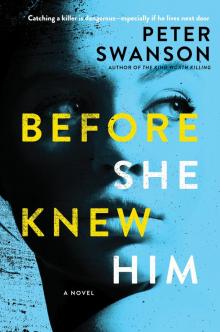 Before She Knew Him
Before She Knew Him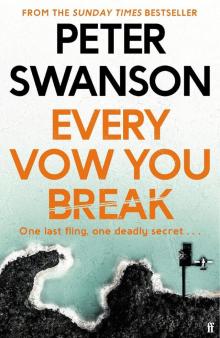 Every Vow You Break
Every Vow You Break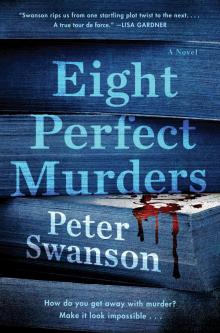 Eight Perfect Murders
Eight Perfect Murders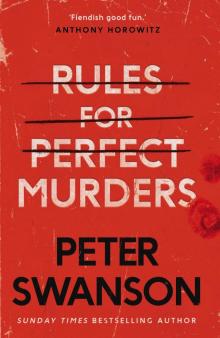 Rules for Perfect Murders
Rules for Perfect Murders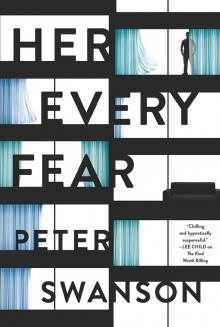 Her Every Fear
Her Every Fear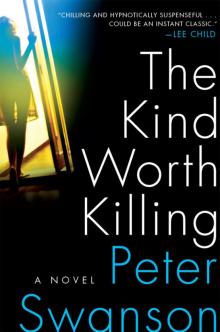 The Kind Worth Killing
The Kind Worth Killing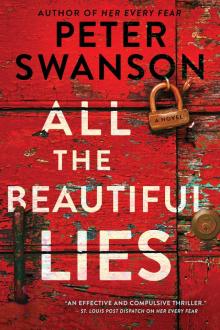 All the Beautiful Lies
All the Beautiful Lies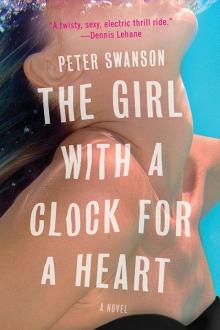 The Girl with a Clock for a Heart: A Novel
The Girl with a Clock for a Heart: A Novel